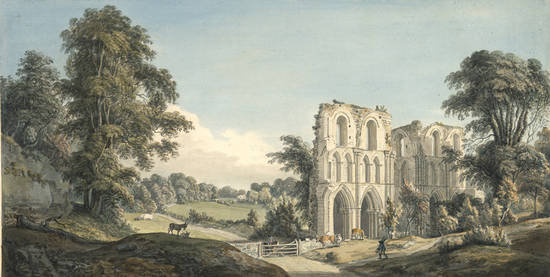Paul Sandby RA
dal 12/3/2010 al 12/6/2010
Segnalato da
12/3/2010
Paul Sandby RA
Royal Academy of Arts, London
The Royal Academy of Arts presents an exhibition of works by Paul Picturing Britain, A Bicentenary Exhibition. The exhibition marks the bicentenary of the artist's death and celebrates one of the Royal Academy of Arts' Foundation Members; it features over 80 works by the artist regarded as the 'father of English watercolour'. Through his extensive tours, initially as a military draughtsman and later as a professional artist, Sandby pioneered landscape painting.

The Royal Academy of Arts presents an exhibition of works by Paul Sandby RA (1731-1809). The
exhibition marks the bicentenary of the artist’s death and celebrates one of the Royal Academy of
Arts’ Foundation Members; it features over 80 works by the artist regarded as the ‘father of
English watercolour’.
Paul Sandby was celebrated in his day. The innovations and subject-matter that he introduced
into the practice of watercolour painting in Britain had a profound influence on artists of
successive generations, including Thomas Girtin and J.M.W.Turner RA. However, from the mid-
nineteenth century, Sandby’s work slipped into obscurity. This exhibition aims to redress
Sandby’s position in the history of British art. It highlights the range and variety of Sandby’s
techniques and subject matter: from his exquisite watercolour depictions of the British
countryside from Surrey to Scotland by way of Wales, to his print series of street vendors which
capture everyday life in eighteenth-century London with Hogarthian wit. Sandby portrayed scenes
throughout Britain, helping to give visual form to the idea of the United Kingdom as a nation
state. Through his extensive tours, initially as a military draughtsman and later as a professional
artist, Sandby pioneered landscape painting. He sought new sites and portrayed familiar ones
with a fresh eye. His art is unrivalled among that of his contemporaries for its remarkable range
of rural, urban, modern and historical subject matter. His work captures the diverse nature of the
landscape of his day and provides an important record of a country experiencing rapid social,
economic and political change.
Travel for edification and leisure, as defined by the Grand Tour, had traditionally been confined
to the cultural sites and landscapes of the European classical heritage, notably Italy. However,
during the second half of the eighteenth century, the popularity of the Grand Tour was
increasingly challenged by the rise of the ‘picturesque’ tour within the British Isles. Tourists
sought variety of scenery which was readily at hand in Britain, evidence of ancient historical
monuments, often in ruinous condition, and manifestations of early industrialisation. They
demanded visual representations that not only recorded the actual topographical and
architectural detail of specific sites but also conveyed their distinct atmospheres and historical
and emotive resonances. Sandby used his mastery of the watercolour technique and his
innovative application of aquatint to meet the ever-growing expectations of both the upper
classes and the increasingly affluent and leisured middle classes.
The exhibition focuses on the finest examples of Sandby’s work from a career which spanned
fifty years. His celebrated watercolours including the majestic landscape The Rainbow (1800)
and the picturesque depiction of Part of Wenlock Abbey in Shropshire (1770) are on display,
together with works which demonstrate the exceptional range of his creative output, from maps
of North Britain (one of which is over 3 metres in length), to paintings, prints and his set of
twelve London Cries, including the curiously titled My pretty little Gimy Tarters (1759). The
exhibition draws on all the major holdings of this prolific artist’s work, including the Royal
Collection, the British Museum, the Yale Centre for British Art, the Royal Academy of Arts and
the extensive collection of Sandby’s work held by Nottingham City Museums and Galleries, as
well as private collections from which works are exhibited for the first time.
More works by Paul Sandby RA and his contemporaries can be seen in "Eighteenth-century
Watercolours from the Royal Academy Collection", which is presented in the Tennant Room, one
of the John Madejski Fine Rooms. The exhibition is open from 9 March 2010 to 16 May 2010.
Paul Sandby RA (1731 – 1809): Picturing Britain, A Bicentenary Exhibition has been organised by
the Nottingham City Museums and Galleries in association with the Royal Academy of Arts,
London. The exhibition has been curated by Professor Stephen Daniels, Professor of Cultural
Geography, University of Nottingham and Director of the UK Arts and Humanities Research
Council programme in Landscape and Environment, Dr John Bonehill, Lecturer in the History of
Art, University of Glasgow and Sarah Skinner, Keeper of Art, Nottingham Castle; with
Christopher Baker, Deputy Director, National Gallery of Scotland, Edinburgh and Maryanne
Stevens, Director of Academic Affairs, Royal Academy of Arts, London.
To accompany this exhibition, the Royal Academy of Arts has published a catalogue highlighting
the work of Paul Sandby. The book examines the remarkable contribution that the artist made to
British art in the eighteenth century.
Image: Paul Sandby, Roche Abbey, Yorkshire, c.1770s.
Watercolour over graphite, 300 x 588 mm. Royal Academy of Arts, London. Photo © Royal Academy of Arts/Slingsby
For further press information, please contact Simone Sagi at the Royal Academy Press Office on tel: 020 7300 5610, fax: 020 7300 8032 or email press.office@royalacademy.org.uk
Open to public Saturday 13 March 2010
Royal Academy of Arts
Burlington House Piccadilly, London
10am - 6pm daily (last admission 5.30pm)
Late night o Late night opening: Fridays until 10pm (last admission 9.30pm)
Amission £9 full price; £8 registered disabled and 60 + years; £7 NUS / ISIC cardholders; £4
12-18 years and Income Support; £3 8-11 years; 7 and under free.



